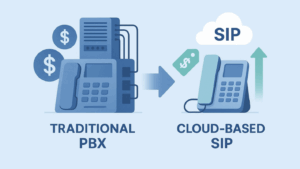
The Benefits of a PBX Phone System and Who Needs One
For many companies, staying ahead of communication trends and keeping up with digital transformations is at the forefront of their business focus. In fact, PBX is the number two technology trend prioritized in customer experience. As more companies set out to look for ways to include a PBX phone system as one of their new digital channels, it’s essential to keep in mind that businesses everywhere can benefit from this inclusion.
Efficient and timely communication is the lifeblood of your operations. If clients and colleagues find it hard to reach you, you will ultimately lose revenue and lower your productivity.
To help you handle incoming communication seamlessly, here is a look at the PBX phone system and which businesses can benefit from it.
What’s a PBX Phone System?
A Private Branch Exchange (PBX) is an organization’s phone system specialized for switching calls among users on local lines. The system also enables these users to share several external telephone lines.
The primary purpose of the PBX system is to cut costs. If all the lines a firm needs to use originated from the phone service provider’s local exchange, the cost would be prohibitive.
The service provider runs a trunk line connected to a switching facility on your premises as a workaround. From there, lines serving various extensions can be set up.
While a PBX system uses Voice over Internet Protocol (VoIP) just like Session Initiation Protocol (SIP), it’s easy to confuse the two. The difference comes in through the logistics and how you operate and use them.
Related: What Are Internal Business Communication Solutions?
Types of PBX Telephone Systems
There are four significant types of PBX systems, and what you ultimately choose depends on your organization’s communication priorities.
1. Traditional PBX
Traditional PBX uses regular telephone lines to originate and collect phone calls.
Back when most businesses were in office, this was one of the go-to solutions to keep all of the individuals in the office connected.
A traditional PBX phone system relies heavily on physical hardware and is usually costly to set up and maintain over time. Typically, you need to pay for each phone line you add if you want to be able to make external calls.
If you don’t have an IT team, you’d need to call someone every time there’s an issue with your phone system to repair it. Not only that, but if one thing goes wrong, it could cause an entire phone line outage and cause unwanted delays in productivity.
Such a system is a legacy one, meaning that the costs are higher than those PBX systems that are VoIP-driven. This will not be the best alternative if you hunt for a new PBX system. Only companies with legacy PBX infrastructure can benefit from keeping it running.
2. IP PBX
Your PBX will rely on VoIP technology instead of traditional telephone lines with this system. There is a significant upfront cost tied to setting up an IP PBX system, but the lower running costs make up for it.
An IP PBX system is not limited by the number of phone lines you can get but is rather constricted to your bandwidth capabilities.
That makes for a more manageable maintenance regimen as compared to a traditional PBX setup.
If you have little space on your premises, then an IP PBX can appeal to you. The system requires less space since all the call data is contained in data packets.
Another critical reason for you to consider an IP PBX is that it offers greater control in the configuration as you do it in-house.
3. Hosted PBX
A hosted PBX system relies on VoIP technology, just like an IP PBX one. The difference is that the former is operated off-site by a third-party provider.
All you do is pay a monthly subscription fee to receive a PBX service’s full benefits and none of the maintenance headaches.
Hosted PBX systems tend to be cheaper due to no related upfront costs. As a result, many small businesses rely on this service.
Even established businesses that can afford an IP PBX system opt for hosted PBX to pass on the maintenance obligations.
Keep in mind, though, that a rule of thumb here is that once your system is serving more than 20 people, IP PBX will be cheaper in the long run.
4. Virtual PBX
A virtual PBX is similar to the hosted PBX system, with the difference being that it’s cloud-based.
A virtual PBX system will handle internal calls through the internet in most instances. Therefore, if you are an organization that doesn’t make many external calls, a virtual PBX can serve you well.
Companies that don’t use many phone features outside of the essential services like voicemail and hold music will also find this system compelling.
What Businesses Can Find a PBX System Useful?
Since communication is a critical component of running your organization, you need the right PBX system to communicate seamlessly. Some firms that might find the system useful include:
1. E-commerce Operators
As an eCommerce business, speed is of the essence for you, including your phone system.
A PBX system can enable you not to keep your customers waiting by directing them to the right team member using an autoresponder.
If you run a home eCommerce firm and want to use a different number (or prefer a non-geographical number), a PBX system can solve that for you. Your provider can arrange for such a number and connect it to your telephone system.
Additionally, a VoIP-based PBX system can help you keep your operational costs low, which contributes to lifting your margin per sale.
2. Family Businesses
A majority of family businesses are small. That means you need a communication system that will grow with you.
Through VoIP technology, a PBX system gives you the flexibility to add phones and numbers as you bring on more workers. You, therefore, end up saving on costs tied to adding new landlines to your office.
Having a VoIP number means your business continuity is stable as you keep the number even if you change locations.
That flexibility in retaining a phone number lets your employees operate remotely without disrupting operations.
3. Tourism and Hospitality
A PBX system can enable auto-responding to customers during peak season for seasonal businesses such as tourism and hospitality.
By deploying a PBX that supports an answering service, you don’t waste time responding to frequent inquiries, which can lead to losing more business.
When high tide hits and clients are pouring in, a PBX system can help you divert calls to your mobile phone to stay in touch even when you’re away from your station.
In addition, a PBX system can scale up and down with your organization, depending on the season you’re in.
The Current State of Communications
The way we use communication solutions in the workplace is constantly changing. From transitioning to a fully remote team or offering hybrid opportunities, businesses everywhere need to learn how to adapt quickly and stay ahead of the trends if they want to continue to streamline productivity and provide the highest quality experience for their customers.
Now, we are seeing new modes of communication grow in popularity. From video calls to live chat bubbles on your website, we as a society are now more connected than ever. However, customers still want a human connection to help them make purchases. On average, if the first contact interaction happens in person or over the phone, 75.3% of problems can be addressed right away. When it comes to text-based communication, this connection is lost, and it can cause you to lose customers in the process if they aren’t getting the answers to their questions quickly enough.
That’s why a PBX phone system continues to be an integral part of any business’s communication solution. Whether you’re looking to keep calls internal between employees or you want your employees to resolve customer problems from the comfort of their homes, there is a phone system that can help you meet your needs and keep things running smoothly.
Even if a traditional PBX phone system no longer serves a purpose for your company, there is a phone system out there that is sure to fit your needs and be a more cost-effective and reliable solution.
We only expect this trend of going virtual and moving to cloud-based communication to continue. In-person sales meetings are turning into video conferences over Zoom. Emails are turning into live chat conversations that happen in real-time. All of these changes in communication will continue to impact the way we communicate with others. The best thing for businesses to do is to be mindful of the trends and look for a way to keep up with the pace.
Related: Why Use VoIP for Businesses in 2022
Keep Your Communication Going
The more efficiently you communicate, the better your operational efficiency and revenues are. Thus, it’s essential to deploy a PBX phone system and ensure that no matter where you are, clients and colleagues can reach you when the need arises.SIP.US is a SIP trunking service provider committed to helping you cut your communication costs while receiving exceptional support. Talk to us today for IP-PBX system services that simplify your operations.


